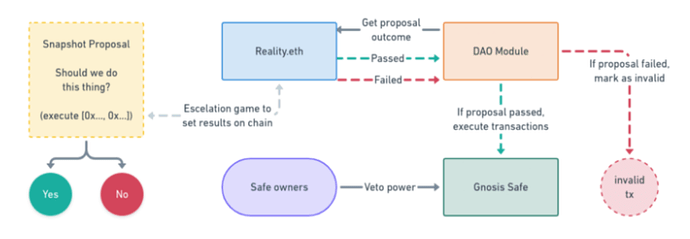GIP-11: Enable SafeSnap
- Enable SafeSnap
- Make no changes
0 voters
GIP: 11
title: Enable SafeSnap
author: @auryn_macmillan
status: Phase 3
type: Meta
created: 2021-06-10
requires: GIP-10
Simple Summary
This is a proposal to update the GnosisDAO’s governance structure in a way that keeps the benefits of off-chain voting while allowing for trustless and permissionless on-chain execution, using the recently released DAO module and SafeSnap plugin.
Motivation
The current governance structure is designed to be maximally inclusive: gas-free voting with delegation. This, however, comes at the cost of some additional trust in the system. Primarily, GnosisDAO must trust that the GnosisDAO Safe Multisig will faithfully execute its will on-chain.
In order to make the GnosisDAO more autonomous, we should more meaningfully give it control over its on-chain execution.
Specification
Gnosis Ltd recently developed the DAO module and SafeSnap Snapshot Plugin.
In combination with the Gnosis Safe, this tool allows for:
- Trustless and permissionless on-chain execution of arbitrary function calls
- Continued use of our existing Snapshot strategies (ERC20 BalanceOf and Delegated ERC20 BalanceOf)
- Cheap/free and low friction participation for Participants.
Rationale
As described in the SafeSnap announcement post, the path to progressive decentralization can be broken down into three steps.
- Multi-sig as a proxy: Gnosis Safe + Snapshot, in which the multi-sig promises to act in accordance with the off-chain votes. This is the status quo.
- Multi-sig as a safeguard: Gnosis Safe + Snapshot + SafeSnap, in which on-chain execution of off-chain votes is handled by the SafeSnap module, but there are still multisig owners that can veto malicious actions or act quickly in the case of an emergency.
- Look ma, no hands!: Gnosis Safe + Snapshot + SafeSnap, in which the multi-sig owners have been removed, and the only way to execute transactions is via the SafeSnap module.
This proposal is to move from (1) to (2) by deploying an instance of the DAO module, enabling it in the GnosisDAO Gnosis Safe, and updating the GnosisDAO Snapshot space to include the SafeSnap module.
Implementation
The DAO module should have the following parameters set:
-
Oracle: GNO denominated instance of Reality.eth
0x8f1CC53bf34932591177CDA24723486205CA7510 -
Reality question timeout:
48 hours -
Proposal cooldown:
48 hours -
Proposal expiration:
7 days -
Minimum bond:
10 GNO - Question Template: see this document
-
Arbitrator: Reality.eth contract, so that it is not possible to call arbitration
0x8f1CC53bf34932591177CDA24723486205CA7510
Transactions that need to be executed:
On the gnosis.eth ENS name:
- set
snapshottext record toipfs://QmPdrDbYVPCz6ASgYvvYWkdpDmZ7pph7TnT4K3zhq1dfP7 - set
daorequirementstext record toipfs://QmP5ptVAmAcBLJB5bpZntADLieaWRc2iN2V8UQBRoQDA56 - set
registrantandcontrollerto0x0DA0C3e52C977Ed3cBc641fF02DD271c3ED55aFe - set
quorumtext record to60,183.480050548
On the deployed DaoModule:
- update
questionArbitratorto0x8f1CC53bf34932591177CDA24723486205CA7510 - update
minimumBondto10 GNO - update
questionCooldownto48 hours
On the GnosisDAO’s safe:
- call
enableModule("0x0eBaC21F7f6A6599B5fa5f57Baaa974ADFEC4613")
